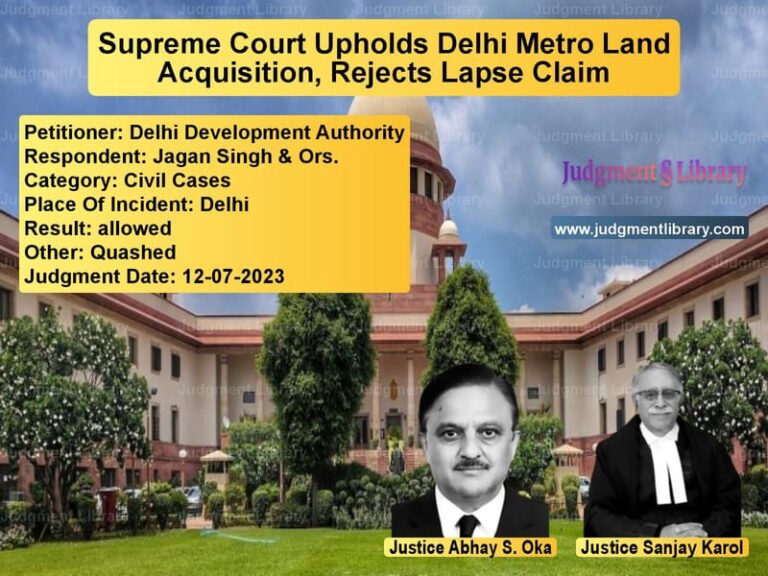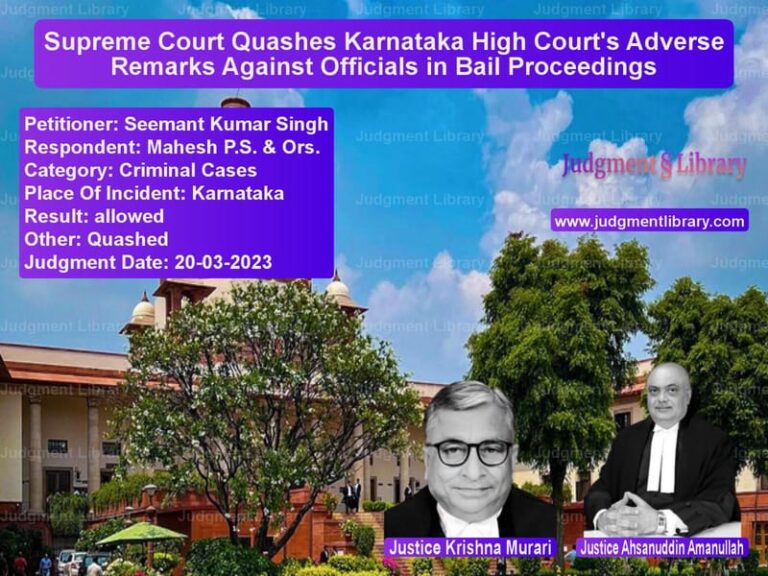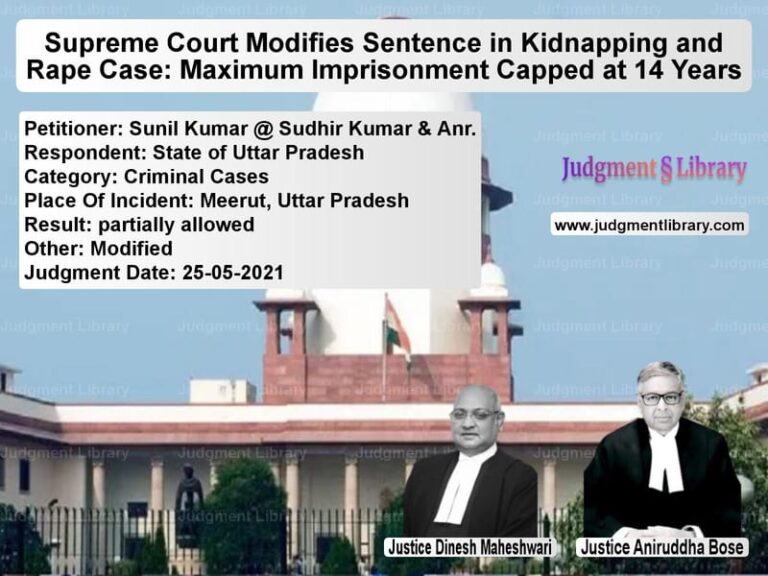False Evidence Case: Supreme Court Quashes Private Complaint Under Section 193 IPC
The Supreme Court of India recently delivered a significant judgment in the case of Narendra Kumar Srivastava vs. State of Bihar & Others. The case revolved around a private complaint alleging the submission of false evidence in judicial proceedings. The Supreme Court ruled that a private complaint under Section 193 of the Indian Penal Code (IPC) was not maintainable unless it was initiated by the concerned court as per the mandate of Section 195 of the Criminal Procedure Code (CrPC). This judgment reinforces the principle that offenses affecting the administration of justice require the sanction of the court where the alleged offense occurred.
Background of the Case
The appellant, Narendra Kumar Srivastava, was an Engineering Assistant at Doordarshan Kendra, Motihari. His dispute stemmed from the non-grant of financial benefits under the Assured Career Progression (ACP) scheme. He contended that his entitlement to ACP benefits, as per a Central Administrative Tribunal (CAT) ruling in O.A. No. 514 of 2002, was wrongfully denied by officials of Doordarshan and All India Radio (respondents 2 to 4).
Despite multiple representations and legal challenges, including an appeal to the High Court of Patna and subsequent writ petitions, his ACP benefits were not granted. The High Court directed the authorities to decide his representation. However, in response, the officials allegedly submitted false statements in the contempt proceedings before the High Court, leading to the dropping of the contempt case.
Feeling aggrieved, Srivastava filed a private criminal complaint under Section 193 IPC, accusing the officials of giving false evidence in the contempt case.
Proceedings Before the Magistrate
The complaint was filed before the Assistant Chief Judicial Magistrate-VII, Motihari, who, on December 22, 2016, took cognizance of the alleged offense and summoned the accused officials. The complaint was based on the contention that the officials had falsified facts in their affidavit during the High Court proceedings, thereby misleading the court.
High Court Appeal and Decision
Respondents 2 to 4 challenged the Magistrate’s order before the Patna High Court through a criminal revision petition. The High Court, on March 30, 2017, allowed the revision and quashed the Magistrate’s order, ruling that:
- The alleged offense involved giving false evidence in judicial proceedings.
- Under Section 195(1)(b)(i) of CrPC, no court could take cognizance of such an offense unless it was initiated by the concerned court.
- The complaint should have been filed by the High Court itself, not by a private individual.
The High Court quashed the proceedings and imposed costs on the appellant.
Supreme Court’s Analysis and Judgment
Challenging the High Court’s order, Srivastava appealed to the Supreme Court, arguing that:
- His private complaint was valid as per the ruling in Sachida Nand Singh vs. State of Bihar, where the Supreme Court held that a private individual could initiate a complaint for forgery even if the document was later used in court.
- False affidavits filed in court should not be shielded from prosecution merely because they were filed during judicial proceedings.
The respondents countered that:
- Section 195 CrPC explicitly bars private complaints for offenses under Section 193 IPC if the alleged false evidence was given in court proceedings.
- As per M.S. Ahlawat vs. State of Haryana, private complaints under Section 193 IPC are barred, and only the concerned court can initiate proceedings.
After analyzing both precedents, the Supreme Court upheld the High Court’s ruling. The Court clarified:
“The offense under Section 193 IPC, when committed in a judicial proceeding, must be prosecuted only upon a complaint made by the court where the alleged false evidence was given.”
It distinguished between two categories:
- Forgery of documents before their use in court: Prosecution can be initiated by private individuals.
- Giving false evidence in court: Prosecution must be initiated by the concerned court under Section 195(1)(b)(i) CrPC.
The Court further held:
“The Magistrate erred in taking cognizance of a private complaint under Section 193 IPC. The proper procedure is for the High Court to initiate prosecution if it deems fit.”
Accordingly, the Supreme Court dismissed the appeal and upheld the High Court’s decision to quash the complaint.
Key Takeaways from the Judgment
- Bar on Private Complaints: The ruling reinforces that offenses related to giving false evidence in judicial proceedings can only be prosecuted through complaints filed by the concerned court.
- Interpretation of Section 195 CrPC: The judgment clarifies that Section 195 acts as a safeguard to prevent frivolous private prosecutions for perjury.
- Distinction Between Forgery and False Evidence: If a document is forged before being used in court, a private complaint may be maintainable. However, if false evidence is given within a judicial proceeding, only the court can initiate action.
- Judicial Oversight on Perjury Cases: Courts must carefully scrutinize allegations of false evidence before initiating proceedings to avoid unnecessary litigation.
Conclusion
The Supreme Court’s ruling in Narendra Kumar Srivastava vs. State of Bihar establishes an important precedent regarding the bar on private complaints under Section 193 IPC. By emphasizing the necessity of court-initiated proceedings for perjury cases, the judgment prevents misuse of legal provisions and ensures that judicial resources are not wasted on unfounded allegations. This decision will guide future cases involving false evidence and reinforce the procedural safeguards under the Criminal Procedure Code.
Petitioner Name: Narendra Kumar Srivastava.Respondent Name: State of Bihar & Others.Judgment By: Justice S. Abdul Nazeer, Justice A.K. Sikri.Place Of Incident: Motihari, Bihar.Judgment Date: 04-02-2019.
Don’t miss out on the full details! Download the complete judgment in PDF format below and gain valuable insights instantly!
Download Judgment: Narendra Kumar Sriva vs State of Bihar & Oth Supreme Court of India Judgment Dated 04-02-2019.pdf
Direct Downlaod Judgment: Direct downlaod this Judgment
See all petitions in Fraud and Forgery
See all petitions in Contempt Of Court cases
See all petitions in Judgment by S. Abdul Nazeer
See all petitions in Judgment by A.K. Sikri
See all petitions in dismissed
See all petitions in supreme court of India judgments February 2019
See all petitions in 2019 judgments
See all posts in Criminal Cases Category
See all allowed petitions in Criminal Cases Category
See all Dismissed petitions in Criminal Cases Category
See all partially allowed petitions in Criminal Cases Category







